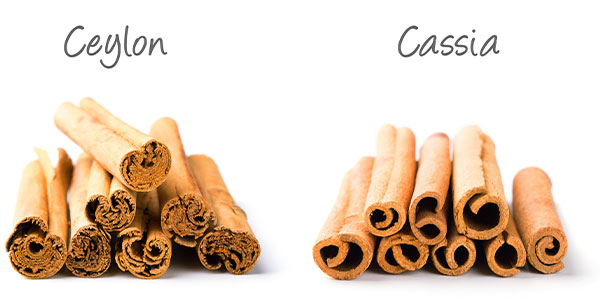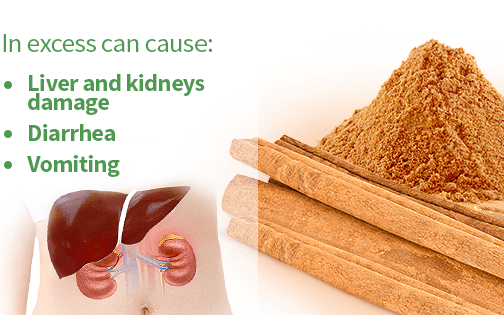Cinnamon, a beloved spice with a rich history and a warm, sweet flavor, is a staple in many households and cuisines worldwide. It is renowned for its versatility, enhancing the taste of both sweet and savory dishes.
Additionally, cinnamon has been associated with several potential health benefits, making it a sought-after ingredient in herbal remedies and dietary supplements.

However, like many substances, cinnamon is not without its potential risks and harms, mainly when consumed in excessive amounts or specific forms.
In this article, we will explore the potential harms of cinnamon, shedding light on the factors that may lead to adverse effects and providing guidance on safe consumption.
Types of Cinnamon
Before delving into the potential harms, it’s essential to understand that there are different types of cinnamon. The two most commonly recognized types are:
- Ceylon Cinnamon (Cinnamomum verum): Also known as “true” cinnamon, Ceylon cinnamon is considered the milder and sweeter of the two types. It is often referred to as “real cinnamon.” This type of cinnamon is widely used in culinary applications.
- Cassia Cinnamon (Cinnamomum cassia): Cassia cinnamon is commonly found in the United States and is often labeled simply as “cinnamon.” It has a more robust, spicier flavor compared to Ceylon cinnamon.
The distinction between these two types is crucial because they contain different levels of a compound called coumarin, which plays a significant role in some potential cinnamon-related harm.

Potential Harms of Cinnamon
1. Coumarin Content
One of the primary concerns regarding the potential harm of cinnamon is its coumarin content. Coumarin is a natural compound found in various plants, including cinnamon, responsible for the sweet and aromatic scent of the spice. However, excessive consumption of coumarin can be harmful to the liver.
Ceylon Cinnamon vs. Cassia Cinnamon: The coumarin content varies significantly between Ceylon cinnamon and Cassia cinnamon. Ceylon cinnamon has much lower levels of coumarin, making it a safer choice for those who wish to enjoy the flavor of cinnamon without the potential health risks associated with excessive coumarin intake. On the other hand, Cassia cinnamon has higher coumarin levels, which can be problematic if consumed in large quantities.
2. Liver Health
The potential harm to the liver due to coumarin is a significant concern. Coumarin has been linked to liver toxicity, especially when consumed excessively. The risk is particularly high when consuming Cassia cinnamon, which contains higher coumarin levels.
Studies have shown that regularly consuming large quantities of Cassia cinnamon can lead to liver damage. The damage can range from mild to severe, depending on the individual’s sensitivity and the amount consumed. Symptoms may include nausea, abdominal pain, and even jaundice. In rare cases, it may lead to liver failure, necessitating medical intervention and, in extreme cases, a liver transplant.
It’s worth noting that the European Food Safety Authority (EFSA) has established safe daily intake levels for coumarin. The acceptable daily intake of coumarin is 0.1 mg per kilogram of body weight. Consuming cinnamon, especially Cassia cinnamon, in amounts that exceed these guidelines can potentially harm the liver.

Cinnamon Herbal Tea – The Spice of Serenity
3. Interaction with Medications
Cinnamon, when consumed in therapeutic amounts, may have the potential to interact with certain medications. It’s crucial to be aware of these interactions if you are on medication, as they can affect the medication’s efficacy or lead to unintended side effects.
Cinnamon supplements, which often contain concentrated doses of cinnamon compounds, may pose a higher risk of drug interactions. Some common medications that may interact with cinnamon include:
- Blood Thinners: Cinnamon can have mild blood-thinning properties, particularly in supplement form. If you are already taking blood-thinning medications like Warfarin, combining them with high doses of cinnamon supplements could increase the risk of bleeding.
- Diabetes Medications: Cinnamon has been studied for its potential to help regulate blood sugar levels. If you are taking medications for diabetes, adding cinnamon supplements to your diet may lead to excessively low blood sugar levels, a condition known as hypoglycemia.
- Liver Medications: Cinnamon, especially Cassia cinnamon, may further burden the liver when consumed in large quantities. If you are taking medications to support liver function or manage liver conditions, excessive cinnamon consumption could potentially counteract the benefits of these medications.
It’s essential to consult with a healthcare professional if you are considering adding cinnamon supplements or significantly increasing your cinnamon intake while taking any medications. They can guide the safe use of cinnamon in conjunction with your medications.
4. Allergic Reactions

While allergic reactions to cinnamon are relatively rare, they can occur. Some individuals may be sensitive or allergic to compounds found in cinnamon, leading to symptoms such as skin irritation, itching, swelling, or even difficulty breathing.
Allergic reactions to cinnamon are more likely to happen with direct contact with the skin, such as through using cinnamon-based cosmetics or fragrances. In rare cases, ingesting cinnamon could also trigger an allergic response.
If you suspect you have a cinnamon allergy or experience any of these symptoms after coming into contact with cinnamon, it’s essential to seek medical attention promptly.
5. Gastrointestinal Discomfort

Excessive consumption of cinnamon, particularly in its powdered form, can lead to gastrointestinal discomfort.
The natural compounds in cinnamon may irritate the stomach lining, causing symptoms such as nausea, vomiting, diarrhea, stomach pain, heartburn, indigestion, and gas.
Some individuals may be more sensitive to cinnamon, making them prone to these discomforts even with smaller amounts. To avoid gastrointestinal discomfort, it’s essential to use cinnamon in moderation and consider opting for milder Ceylon cinnamon, which contains lower levels of potentially irritating compounds.
Staying hydrated and consuming cinnamon as a meal can also help mitigate these symptoms. If discomfort persists, consult a healthcare professional.
Safe Consumption Guidelines

Cinnamon, when used in moderation and in its milder Ceylon cinnamon form, can be enjoyed safely without significant risks.
To ensure the safe consumption of cinnamon, consider the following guidelines:
- Choose Ceylon Cinnamon: Opt for Ceylon cinnamon when possible, as it has significantly lower coumarin levels than Cassia cinnamon. This reduces the potential risk to your liver.
- Moderation is Key: Use cinnamon in your culinary creations in moderation. A sprinkle of cinnamon on oatmeal or a dash in your morning coffee is generally safe and can add a delightful flavor.
- Be Cautious with Supplements: If you are considering cinnamon supplements for potential health benefits, consult a healthcare professional before starting any regimen. They can guide dosage and potential interactions with medications.
- Monitor for Allergic Reactions: If you suspect you may be sensitive or allergic to cinnamon, perform a patch test with cinnamon-based products like cosmetics before applying them to your skin. Be mindful of any unusual reactions and seek medical advice if necessary.
- Avoid Excessive Consumption: Excessive consumption of cinnamon, particularly in its Cassia form, should be avoided. This includes refraining from consuming large quantities of cinnamon powder or concentrated supplements.
- Consult a Healthcare Professional: If you have underlying health conditions or concerns about how cinnamon consumption may affect you, consult a healthcare professional.
Recommended Reading – Cinnamon Herbal Tea – The Spice of Serenity
